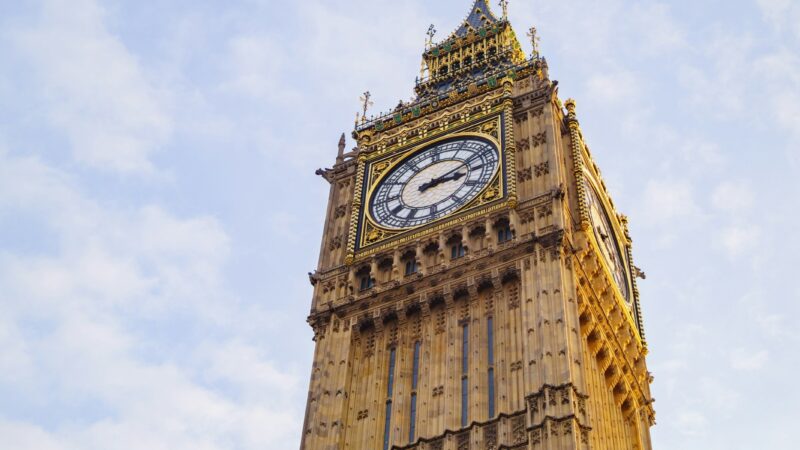Why Insects on an Island cannot Fly
When British biologist Charles Darwin (1809 – 1882) researched the birds and insects living on tropical islands in the 19th century, he observed that many species had gradually abandoned their wings. Insects were equipped with small legs and feet, but no flying apparatus.
The reason they were without wings was because their innate survival instinct would kill them. If the tiny, feather-light insect were to take off and – through a tandem of ocean winds and its curiosity – land on the sea, in all probability it was never to return home again. Nature has preserved these bugs from the dangers of this instinctive trait, of their deceptive curiosity. She has deprived these little critters of the weapons to accidentally, and in all their enthusiasm, kill themselves. But why didn’t nature do the same to us? Why did we get wings, with all the resulting consequences? More than a comparison, this is a metaphor. A metaphor that bespeaks the hubris and curiosity of human beings. It is also a metaphor about censorship and ill-considered decisions, but we’ll come to that at the end. Luckily this analogy simultaneously offers an antidote. An antidote that comes in the shape of conservatism, and some apolitical common sense.
Curiosity
Anyone who studies human behavior and its history notices that people have a fundamental fear of standing still, both physically, culturally and intellectually. As humans we – ab initio – have a reflex to think linearly, in past, present and future. This typical forward-thinking stems from the fundamental curiosity that characterises human beings. With necessity and inevitability, we search for a human nature and the principles that can construct our being. We do not only ask questions, but we also live the questions – after the spirit of Rilke. There is a constant desire to seek them out, study them, weigh them and above all conclude them. We have been doing this since the Homo sapiens developed self-awareness – years and years ago. This curiosity makes it difficult and almost unnatural for man to resign himself to his position, stand still and appreciate what he already holds.
From this curiosity, then, stems the illusion that as we progress more and more, we will eventually be able to grasp something better. Or in other words, we fly off to the perfect island where everything will be better than on the dreary island we were born on. An island-insect, if endowed with thoughts and desires similar to ours, would want to fly to another island, and might even try to do so instinctively even without these thoughts and desires. We, unlike these insects, are not held back by any natural limitations. We have managed through reason, tools and technology to make our way to any other island on the globe. This curiosity and ingenuity, however, holds significant challenges and perils for a society. The few people who seem to notice these risks are the conservatives, and they are the only ones who – often at the expense of their own image – can offer some counterweight to these innate sentiments.
Conservation
Conservatism is – as the late Sir Roger Scruton (1944 – 2020) so beautifully observed – the philosophy of conservation. It is the philosophy of preservation, to protect what is good, to be grateful for what we have and to be critical of the delusion of the day. In other words, it is a philosophy born of love and appreciation. Love for a shared culture, land, language and country and appreciation for the work and sacrifices of the people who created such a place. Perhaps Austro-Bohemian composer Gustav Mahler’s comment encapsulates this very idea most succinctly, and deserves its mention: “Tradition is not the worship of ashes, but the preservation of fire.”
As a philosophy she seems – prima facie – rather stately and dusty, but not particularly bellicose or harmful. Yet today the majority of the so-called intellectuals seem to think of conservatism as some dubious ideology, something for old white men or a thing from a different time.
I stop writing for a moment, sip at my coffee and and wipe the ashes off my trousers. I think to myself: is this really what being conservative means? I am 24, well of this age, and do not – yet – feel like an “old white man”, however that should feel. But why do the people around me, my friends, fellow students, politicians, journalists, teachers, writers and philosophers seem so numb to these sentiments? Why the bad connotation of conserving something that is good?
After all, we conserve all sorts of things. In museums and archives, experts work every day to preserve ancient artifacts, statues, rugs, coins, drawings or paintings, to prevent them from being lost or broken, from being consumed by microscopic bugs, moisture or adverse temperatures. We value these objects. They are worth our resources, time and energy and deserve to be passed on to the next generation who will – hopefully – develop the same love for them. Conservatives who delicately, scrupulously and meticulously handle the fragile ideals on which our culture was built, are somewhat comparable to them.
However, what can be argued is that this is a skewed comparison because the conserved object is fundamentally distinct in both situations. Many people would argue that, unlike museum objects, the conservative is not trying to protect something that is worth protecting. Indeed, the opposite is often claimed, the conservative wants to conserve something that is inherently bad. Conservatism wants to perpetuate old patterns of power, inequality, hatred and oppression, preserving something that should have been destroyed and forgotten long ago. Let us not fall into this trap and assume that there are – still – a plethora of things worth preserving and cherishing.
The Open Sea
To ‘island-insects’, flying was a useful – and presumably quite ‘fun’ – quality that was being eliminated to ensure their survival. Thus, the creatures also parted with certain opportunities that existence offered them. They no longer enjoyed the freedom enjoyed by their ancestors, with the wind in their tails and their heads in the clouds, but it made something else possible, namely their survival.
The survival of a culture is less visible than the survival of an individual, a football coach in difficult waters or an Iberian bull-fighting for its life in a Madrid arena. It does not always perish in revolutions or iconoclasts, but in a quietly growing disinclination to conservation and stagnation. One only has to look at publishing house Puffin – censoring dozens of words in Roald Dahl stories last year – to see the pitfalls of such beliefs. Collectively we say: let’s make tabula rasa and finally move forward as a society”. In that same capacity however, we might leave behind something that may be more fragile and valuable than we hold it to be.
An old Russian adage can probably convey my message more adequately than my own pen can: you are born where you are needed, and that is on your own island. Let us not get lost in the endless opportunities that existence offers us, but celebrate its inherent beauty. Let us not fly too close to the sun or too far from our island, but take care of what we have been given, lest evolution eventually take away our wings too. For if we rush out to sea, we may realise that this island was not so bad after all, and will come to the painful conclusion that, so deep in the open ocean, this place may lie forever behind us.









Time To Stop Being Conservatives
‘Conservative’, big and small ‘c’, is blah. Blah party, policies, politicians, polls, prospects, and that’s just the ‘p’ words.
Let’s deal with ‘party’ first. Perhaps you’ve already stopped being a Conservative. There’s plenty of debate among the duckies about leaving, destroying, destroying and rebuilding, long marching through, etc. the Conservative Party. Whatever, sure, broadly, one way or another, there should be a proper political force which reflects ducky views. More on this later.
The real question is this: should you even be a conservative, let alone a Conservative, any more? What is the virtue of being a ‘conservative’? It’s a small tactical mistake, with large consequences, but easily tweaked and fixed. The Conservative Party may present itself as conservative and full of people who are not. How has that worked out?
Policies. What on a practical political level has ‘being a (C/c)onservative’ got you for the last decade, or more? What is it getting you now? What does it look like it’s going to get you in the next decade…or more?
Politicians. Ultimately, it’s these guys to blame for the blah policies. It shouldn’t be any surprise that the Conservative Party has blah policies though. Just look at its politicians. I’ve written at length (see the May 2022 magazine) about how, basically, the Conservative Party doesn’t select for competence, it selects for loyalty, and how changing its composition is unrealistic. You’re just going to have to be stuck with a ministerial cadre which belly flops, marries pensioners, plays hide and seek, and gobbles knobs for public entertainment. Is it even accurate to say that these people present as ‘conservative’ while failing to govern as conservatives? In any case, why are you surprised that they’re failures, and why would you care to keep associating with them? It’s time to stop being conservatives.
Polls. When the presentation of ‘conservative’ is so beyond saving, all that’s left is the reverse. Be conservative, act conservative, but don’t care to present as a conservative. Keep all the principles, attract the people who have them, those who like to pretend they don’t because it’s not fashionable, and those who are merely superficially put off. It costs you nothing but, what, comfiness, pride, what? To ditch a label which gets you nothing practically or aesthetically?
Jake Scott is right. Conservatives aren’t cool. Isn’t it incredibly telling that I’m by far the coolest person he knows and I’m not a conservative? It’s why I’m telling you not to be too. It’s not just the young fogeys, Thatcher throbbers, port & policy chortlers, MP-selfie-profile-pictures – does that cover it? – it’s the concept itself.
Prospects. Alright, this is a bit flimsy, and I’m done with this ‘p’ gimmick. ‘Conservative’ keep you trapped in a progressive paradigm, limiting your prospects. You are conservative relative to their progress. Sure, they’re progressive relative to what you want to conserve, but is that really how it’s taken in the zeitgeist? It doesn’t work the other way around. ‘Conservative’ doesn’t sound like you want to keep what’s what. It sounds like there’s one of two broad choices you can be, left/right, Conservative/Labour. What is it to present as the ones who just want to stick where you are and do nothing? “But there’s plenty I want to build and fix and do to make the UK excellent”, you say. Good! I hear you. In fact, a line from The Mallard’s own Wednesday Addams in her review of Peter Hitchens’ new book stood out to me. “He mourns not for a pristine past, but a future that never was”. Does the word, name, presentation, etc. of ‘(C/c)onservative’ ever connote that idea too? Would anyone associate the word or concept of the future with ‘(C/c)onservatives’ on Family Fortune? Whatever, this is a small tweak too.
Don’t just mourn, don’t be one of those people who seem to enjoy self-pity, wallowing in the ‘man among the ruins’ thing. Even if it’s not so negative, don’t just be twee, oh the green and pleasant land, God save the King, blah. Find and keep what’s valuable, think about how to conserve it, but also how to bring it into the future. While you’re at it, adjust your attitude toward the future. Hitchens is an old man, so whatever, maybe it’s forgivable that all he can do is mourn for a future that never was. But you can act for a future that will be. It will. And you have to totally unironically, unreservedly believe that. Make it a matter of truth!
Jake Scott is right again. Stop pretending as if you are living in a liberal pluralist society in which different ideologies are just different options in a marketplace. I’m not sure this is quite what he meant, but it’s my take: some ways of doing things are better than others. Whether that’s economic, educational, social, whatever. There are better and worse ways of running a country. The progressives are objectively shit.
Truth. You are not a conservative, you are not right wing, even, you just believe in the truth. Twitter has been in the news, let’s use that as an example. The now dismal, disgraced, and now discarded Vijaya Gadde, could not even begin to conceive that Twitter had biased rules against conservatives on defining ‘misgendering’. It’s because her opinion wasn’t just an opinion. It was the truth. Of course, she was wrong. You are the ones with the truth. This is going to get tiresome referring to the same Jake Scott video, but he is right again. If anything he isn’t radical enough. On some things there just is no battle of ideas. There is no debate on insanity. Not in the real world, at least, maybe stuffed away in university philosophy departments where the debate can keep going for 3,000 years without resolution and not interfere with anything that matters.
Anyway, the truth is also that broadly conservative ideas about a whole range of topics are held by most of the country. Brexit was the big one, already proven. Next could be anything from immigration to British values, house building, tax, or all of them if only there was a proper political force prepared to go for it. More on that right at the end. In the meantime, what you believe is true and it will come to be, because you are going to make it happen.
This article hasn’t come out of nowhere, exactly. There does seem to be some buzz around the idea of ‘sensible centrists’. Is that the right branding? Not sure about it, but the concept is onto something which is good politics.
TL;DW, examples from the linked video: 1) it’s extreme to import hundreds of thousands of people to the country, the sensible position is to set immigration by what the country needs, 2) it’s extreme to let crime go rampant and obsess over the relatively small problem of one or two racist police, the sensible position is to be tough on crime, or 3) it’s extreme to hire thousands of people to obsess over a small number of people getting offended, to the tune of billions, rather than just not cater to that hysterical timewasting minority.
It’s not an entirely new idea, but popularising it in ‘right-wing’ circles is valuable, and so is the formula, which is new. The proof that it’s good is that it has been done before. How far back do you want to go? Curtis Yarvin presents Caesar as an imperially purple (red/blue/Republican/Democrat) end to chaotic fighting between extremes – a sensible centre. More recently Vote Leave presented the ‘leave’ option as a sensible left and right-backed, cross-party, non-UKIP, sensible centre which was merely taking back control from an extreme EU, where actually remaining would be the less certain, more dangerous, crazy option.
Does the UK feel stable, well-governed, on the right and true path, today? Is the UK sensible or extreme? See the appendix below if you need any help. Everything is totally fucking awful. It doesn’t even have to be! It could just be well governed instead. You’re not a conservative, you just want a good government.
Today, it is governed by Conservatives. It has been backed by conservatives or otherwise simply just not replaced by conservatives, and in any case conservatives have been totally contaminated by the idea of Conservatives. On top of all of this, when you have the truth on your side, what is there even to be gained by being (C/c)onservatives? Again, see the appendix below for some sense of the scale of the problem.
I’m not sure what exactly is next. Rallying around any sort of name or group or identity, especially if it isn’t totally solid and ready, presents a target. For now it’s enough to simply reject the idea that you are a conservative, or right-wing, especially when asked or characterised as such.
Photo Credit.